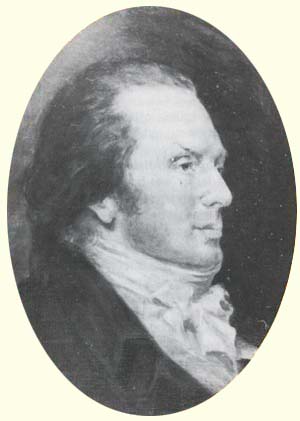
Nicholas Gilman represented the State of New Hampshire at the Constitutional Convention. He later served in the U.S. House of Representatives and the U.S. Senate.
Early Life
Nicholas Gilman was born on August 3, 1755, in Exeter, New Hampshire. His brother, John Taylor Gilman, was also a successful politician, serving as New Hampshire’s governor for 14 terms. Their childhood home is now the American Independence Museum. Gilman attended local schools and worked at his father’s general store. When the Revolutionary war broke out, he enlisted in the New Hampshire militia.
Revolutionary War
In November 1776, Gilman was appointed to serve as administrative officer of the 3rd New Hampshire Regiment. The regiment would serve a prominent role in George Washington’s Continental Army, participating in key battles at Fort Ticonderoga, Saratoga, Monmouth and Yorktown. Gilman’s stature in the army also rose as well, becoming a captain in 1778. Following his father’s death in 1783, Gilman retired from the Continental Army and returned to Exeter to take over the family business.
Constitutional Convention
In 1786, the New Hampshire legislature appointed Gilman to the Continental Congress. Although he was appointed to represent the state at the Annapolis Convention, he was unable to attend. Convinced that a stronger central government was needed to strengthen the economy and unify the colonies, Gilman was pleased to be selected as a delegate to the Constitutional Convention.
Unfortunately, Gilman and fellow New Hampshire delegate, John Langdon, were late to arrive. By the time they got to Philadelphia, the debates were well underway and the groundwork had been established for a new government. Nonetheless, Gilman was able to contribute by serving on the Committee on Postponed Matters.
On the day of signing, Gilman characterized the new government as “the best that could meet the unanimous concurrence of the States in Convention; it was done by bargain and Compromise, yet, notwithstanding its imperfections, on the adoption of it depends (in my feeble judgment) whether we shall become a respectable nation, or a people torn to pieces … and rendered contemptible for ages.” While Gilman’s continued service in the Continental Congress kept him away from New Hampshire, he still worked hard to secure ratification, calling on his brother, John, to help lead the fight.
Public Office
Gilman played a significant role in the new government. He served in the U.S. House of Representatives from 1789 until 1797. In 1793 and 1797, Gilman was a presidential elector. After returning to Exeter, he served in the New Hampshire legislature in 1795, 1802, and 1804.
While he was a staunch federalist for most of his political career, Gilman later joined the Democratic-Republican party. In 1801, President Thomas Jefferson appointed him to serve as a federal bankruptcy commissioner. In 1804, Gilman was elected to the U.S. Senate. He served until his death at the age of 58 in 1814.







